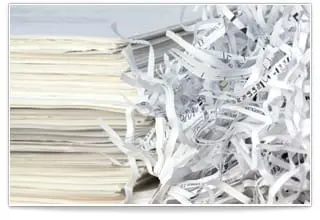To Shred or Not to Shred
Every firm has documents that should be destroyed, not simply discarded.
Text
Every firm has documents that should be destroyed, not simply discarded. Documents must be destroyed because firms need to maintain confidentiality when dealing with employee, client or business records that contain personal or proprietary information. Furthermore, firms need to develop a formal document destruction policy that includes a schedule that is adhered to consistently.
Every firm is entrusted with information from its employees that must be kept private; employees have the legal right to have this data protected. Just as important is the duty of the firm, which can be a contractual duty, to protect confidential information received from clients. Aside from this obligation, firms need to avoid disclosing proprietary information about business activities or those of its clients to the firm’s competitors. Drafts of documents, correspondence, and even memos can contain information that might interest competitors.
 While is it important to maintain carefully constructed project files, sometimes for years, to provide for a proper defense in the event of a professional liability claim, it is not necessary to keep every document that is created by or flows through a professional service firm.
While is it important to maintain carefully constructed project files, sometimes for years, to provide for a proper defense in the event of a professional liability claim, it is not necessary to keep every document that is created by or flows through a professional service firm.
However, it is also essential for professional firms to be aware of important issues raised by electronic data – including the requirements of the rules of discovery and what must be produced in the event of litigation. The sources and formats of electronic data are multiplying quickly – as is its sheer volume. Few companies proactively manage the storage of electronic information – or have policies on how data is created, exchanged, retained, disseminated, or destroyed. In addition, metadata or the hidden data describing an electronic document, can divulge information detrimental to your firm. The AIA Trust white paper, “The ABC’s of E-Data,” offers additional information on this topic to help ensure appropriate protocols and minimize risks in your firm.
Developing and Enforcing a Policy
Each firm needs to develop a policy for when specific types of documents should be destroyed. The established program should be logical, thorough, and rigorously enforced. A firm that destroys documents without a program of routinely destroying records exhibits suspicious disposal practices that could be negatively construed in the event of litigation. In developing the policy, it will be necessary to consider the value of a record to the firm and any governing legal requirements. At times, a contractual commitment to a client may establish specific retention and destruction obligations.
Proper safeguards are essential to prevent information from ending up where it could be readily, and legally, available to anybody. Recycling or disposing of records is not enough. Trash can be the most available source of competitive and private information from a firm. Once a recycling or disposal company obtains waste paper, that company has no obligation to keep information confidential. If private and proprietary data is discarded without being obliterated, a firm exposes itself to the risk of criminal and civil prosecution, as well as embarrassment and the potential loss of business. From a risk management perspective, the only acceptable method of discarding stored records is to destroy them in a way that ensures that the information is obliterated, usually by a shredder. Documenting the exact date that a record is destroyed is a prudent and recommended legal precaution.
Retaining Information for Litigation
Even if a policy is set and routinely followed, documents important to a dispute resolution process or government action must be preserved. The rules of civil procedure in federal courts require that each party provide all relevant records to opposing counsel within 85 days of the defendant’s initial response. Evidence of the destruction of documents that might be subject to this discovery rule could result in legal sanctions and lost credibility. If an investigation reveals that relevant documents have been intentionally destroyed, the firm could be guilty of obstruction of justice. In the event of a contractual dispute or third-party claim against the firm, regularly scheduled document destruction may have to stop. Destroying stored records according to a set schedule, however, could limit the amount of material a firm must search through to comply with discovery rules.
Victor and CNA work with the AIA Trust to offer AIA members quality risk management coverage through the AIA Trust Professional Liability, Business Owners, and Cyber Liability Insurance Programs to address the challenges that architects face today and in the future. Detailed information about both these programs may be found on the AIA Trust website, www.TheAIATrust.com.
More on Firm Management & Professional Liability

Professional Liability Insurance Database
Professional Liability
Self Assessment Tests (SATs)
Firm Management ▪ Professional Practice
Is Your Firm Eligible for a Premium Credit?
News ▪ January 2009